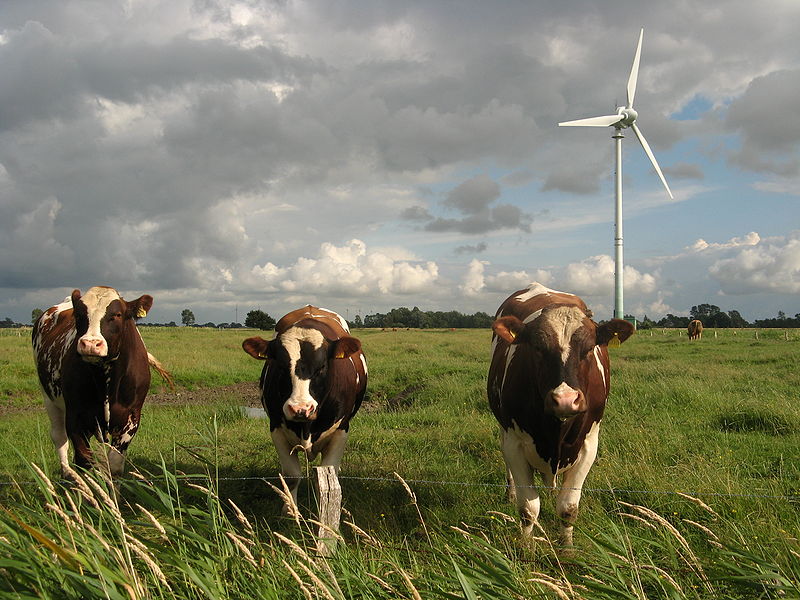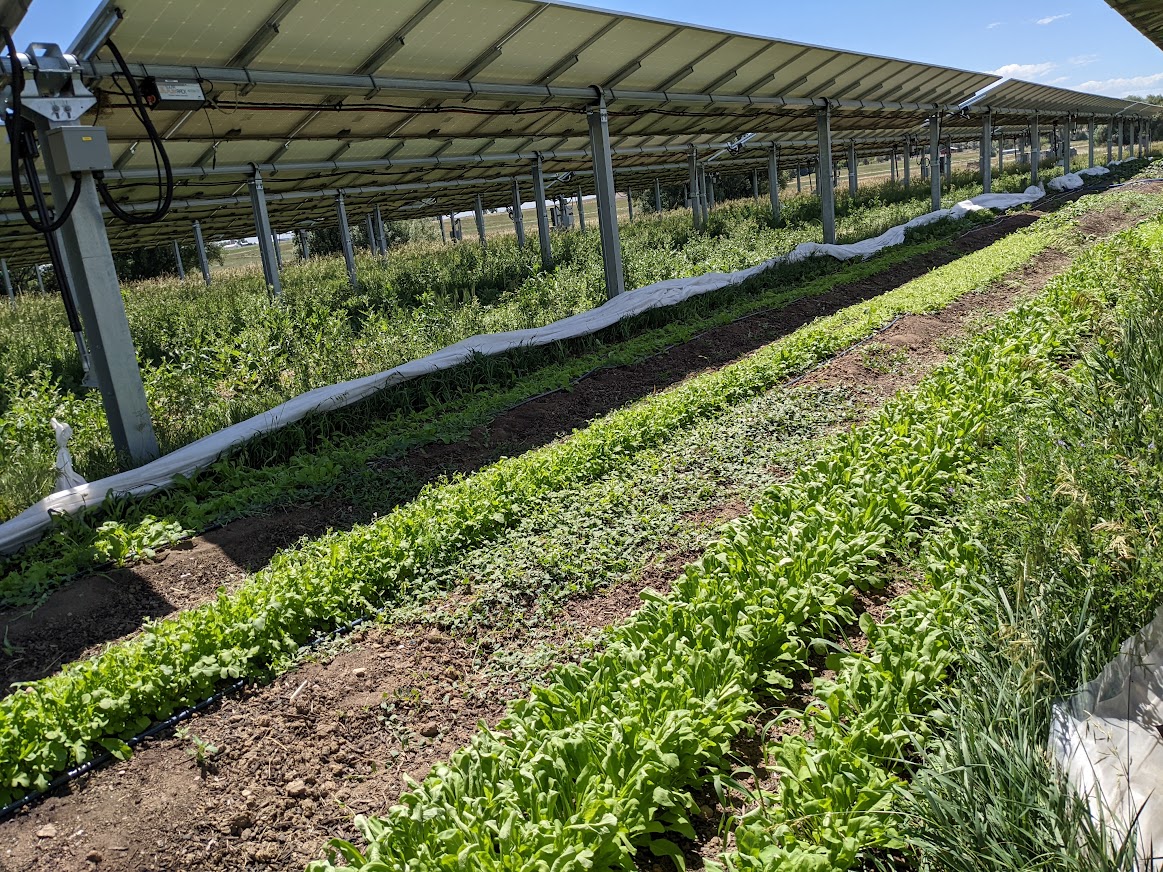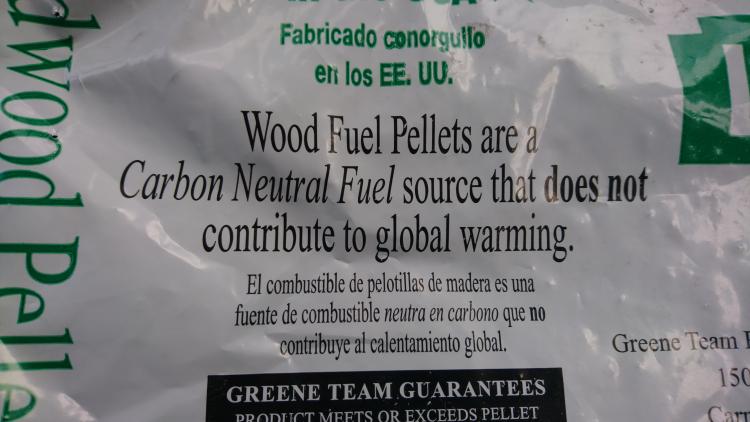- Pros: A few benefits of solar energy are that it is relatively predictable and reliable, it is effectively limitless, and that it does not create any emissions/pollution when generating energy.
- Cons: The main drawback is that it is intermittent, both in terms of the sun only being in the sky 50% of the time, and that weather can impact it significantly. Solar is also very diffuse, meaning that it is not very concentrated, and so, usually a large area is required to provide a lot of useful energy. Solar PV used to be very expensive but is now cost-competitive.
- Pros: More good news is that the wind will never disappear as long as the sun shines and the earth is spherical, and like solar, wind does not generate emissions. Well-sited onshore wind is actually the least expensive form of electricity.
- Cons: However, the wind is also variable - more in some locations than others - and is less predictable than solar energy in most locations.
- I want you to think for a moment how the energy in moving water started out as solar energy. (This is a good thought experiment in energy conversion.) Answer: Remember that water flows downhill, and so the motion energy in flowing water started out as gravitationalpotential energy. How does water get this potential energy, i.e., how does it get uphill? Mostly from evaporation caused by the sun!
- Pros: In terms of other benefits, like solar and wind, hydropower does not generate emissions, and is very consistent and reliable in most locations. Though it should be noted that some methane emissions result when organic material behind dams decomposes.
- Cons: There are some drawbacks associated with large hydropower installations (see the EIA's Hydropower and the Environment website for some examples), and in some cases, very big environmental and social drawbacks (e.g., in the Three Gorges Dam in China). All of these factors are important to keep in mind. Hydroelectricity is the single biggest source of renewable electricity in the world.

Figure 1.7: Cattle grazing next to a wind turbine. One underappreciated benefit of wind is that livestock such as cattle and sheep can safely use the land immediately surrounding the turbine. Many farmers across the world rent or own their own turbines.
All of these sources renew themselves over short periods of time and do not diminish. And though intermittent, none of these sources are going to disappear in the foreseeable future. They are textbook renewable energy sources.
Good to Know: Agrivoltaics
Agrivoltaics are a burgeoning systems-thinking application. Agrivotaics combines - you guessed it - agriculture and photovoltaics. Ground-mounted solar arrays are a great application of solar PV technology, but they do take up a lot of space relative to their energy output. So why not find a way to use all of this space? Enter agrivoltaics! With some careful design considerations (e.g. knowing which plants are shade-tolerant or even prefer some shade), crops can not only be successful but in some cases more successful in terms of production than when planted in an open field. This is particularly helpful in hot, dry climates, such as the eastern part of Colorado, which is pictured below. But it can be successful in more humid and cooler climates as well.
Agrivoltaics are becoming increasingly recognized and researched throughout the U.S. and internationally. Feel free to browse through the National Renewable Energy Laboratory's (NREL) article about agrivoltaics for more information.

Okay, so what about biomass and biofuels? They are both derived from living or recently living things (trees, corn, algae, sugarcane, etc.) They also get their energy from the sun (anyone sensing a pattern here?), and plants are usually pretty good at regenerating themselves. But I want you to take a minute to try to think about examples of biomass and/or biofuels that might not be "renewable," in the sense of the definition above. Can you think of any examples of non-renewable biomass?
Nearly all forms of biomass and biofuels are renewable. Corn-based ethanol is the most-used source of bio-based energy in the U.S. Corn can be grown in the same field year after year, so it is renewable. Whether or not it is sustainable is another question, which will be addressed later. The primary source of bioenergy in Brazil is sugarcane. Nearly all of Brazil's vehicles are able to use 100% sugarcane ethanol for fuel. (Contrast this with the U.S., where most automobile engines are only required to be able to handle up to 10% ethanol.) Sugarcane grows year-round in Brazil, so is definitely renewable.
There are many other biomass sources that fit our definition of renewable, including animal dung, algae (for biodiesel), jatropha nut, soybean, switchgrass, and more. Wood is used around the world as a source of heat, particularly for cooking. Most trees and shrubs regrow relatively quickly, so they are generally considered renewable. But even a fast-growing tree like an oak (up to two feet per year, according to the National Arbor Day Foundation) has limits. Though most biomass sources are considered renewable, keep this in mind: if you harvest a renewable resource faster than it regenerates, it will not be able to renew itself over time. We will revisit this point in a later lesson, but it is important to remember.
Not all Renewables Are Created Equal
Most renewable energy sources are carbon-free. This means that they do not emit any carbon dioxide when they generate energy. Solar, wind, and hydroelectric are carbon-free. Nuclear, though not renewable, is also considered a carbon-free energy source, because unlike coal and natural gas, it does not burn. As noted in a previous reading, nuclear energy generates heat through fission, not combustion. Biomass and biofuels are often considered carbon-neutral because they emit carbon dioxide when they are burned. So, why are they carbon neutral?

Figure 1.9: Carbon neutral wood pellets. This is printed on a bag of wood pellets, which are used for heating in a pellet stove. These emit CO2 when burned, but effectively do not impact the level of carbon dioxide in the atmosphere. The pellets are made of leftover sawdust from timber operations. Note that CO2 was emitted in processing, packaging, and shipping, so "carbon neutral" is a bit misleading.
Credit: D. Kasper.Good to Know
The International Energy Association (IEA) is a good source of information for international energy data. The US EIA (not to be confused with the IEA) publishes some international data as well, but IEA is usually the first place I look. The chart below shows the estimated energy use by type worldwide in 2016, and the data are from their 2018 Key World Energy Statistics document. Note that the energy unit they use is Mtoe, which stands for million tons of oil equivalent. A Mtoe is equivalent to about 0.04 quads. In other words, there are about 25 Mtoe in a quad. The amount of energy is not important for our purposes, but please take note of the percent of the total that each energy source provides.
FYI, another good, reliable source of global energy data is BP's annual "Statistical Review of World Energy." It is worth browsing if you are interested!
In 1973, the total was 6,101 Mtoe distributed in the following way: Coal: 24.5% Hydro: 1.8% Oil: 46.1% Biofuels and waste: 10.5% Natural gas: 16.0% Nuclear: 0.9% Other: 0.1% In 2016, the total was 13,761 Mtoe distributed in the following way (2014 percentages in parentheses): Coal: 27.1% (28.6%) Hydro: 2.5% (2.4%) Oil: 31.9% (31.4%) Biofuels and waste: 9.8% (10.3%) Natural gas: 22.1% (21.2%) Nuclear: 4.9% (4.8%) Other: 1.7% (1.4%)
There are a few interesting things to point out from the chart above.
- First of all, Total Primary Energy Supply (TPES) refers to all original or primary energy consumed. For example, if your electricity is supplied by a power plant, the energy your electronic device is using right now is not primary energy because the electricity was converted from an original source (e.g., coal, oil, natural gas, nuclear). Given that electricity generation is always less than 100% efficient (sometimes much less, per the previous section), the primary energy used by your device is greater than what shows up on your electric bill. Incidentally, the "energy sources" on the left-hand side of the sankey diagram that you looked at earlier this lesson are primary energy.
- Another interesting thing to point out is that biofuels are lumped together with "waste." In many parts of the world, including many states in the U.S., if you burn garbage to produce heat and/or electricity, it is considered a biofuel, and thus renewable. I'll leave it to you to think about whether or not that is reasonable. But note that biofuels (and biomass) constitute the majority of that "slice" of the global energy pie.
- Hydro is at only 2.5%. But where are wind and solar? We hear about them all the time in the U.S., and in other parts of the world. If you read the fine print at the bottom, you'll see that wind and solar's contribution was so small that it was lumped into the "other" category, at a measly 1.7%. This has improved since 2015 (and was 1.1% of the total in 2012), and in fact has been growing at an all-time high rate, but there is still a long way to go before wind and solar make a major dent in the global energy regime.
Figure 1.8: Sugarcane field in Brazil. Brazil is the world's leading producer of sugarcane and sugar-based ethanol. Even the waste material from the sugarcane extraction process can be used for energy generation, or to make secondary products like compostable plates and silverware.
Non-Renewable Energy
Non-renewable energy sources diminish over time and are not able to replenish themselves. In other words, they are finite, and once they are used, they are effectively gone because they take so long to reform.
You have already read about the four non-renewable energy sources: coal, oil, natural gas, and nuclear. Let's start with coal, oil, and natural gas, which (as you read earlier) are referred to as fossil fuels. Fossil fuels were created from the remains of dead plants and animals. The source material is renewable (it's biomass!), but since they take millions of years to form, they are not replenished over a "short" period of time, so are non-renewable. Fossil fuels are forming somewhere under your feet right now, but don't hold your breath waiting for them to finish.
The nuclear energy we use comes from an isotope of uranium called U-235. Unlike fossil fuels, U-235 has cosmic origins: it was formed by one or more supernovae around 6 billion years ago, about 1.5 billion years before the Earth was formed (a supernova is a collapsing star, "supernovae" is the plural form of supernova) (source: World Nuclear Association). Again, this is not renewable on a human timescale.
All fossil fuels emit carbon dioxide (CO2) and other emissions when they are used to generate energy. Recall that they are made mostly of hydrogen and carbon, and the carbon mostly ends up as CO2. Nuclear is considered carbon-free, because it is not burned, and it is not made of carbon. Remember that energy is extracted through fission or splitting of atoms. This generates heat, but no emissions. (It is important to note that it does result in very dangerous and long-lasting radioactive waste, but that will be addressed in a future lesson.)
Non-renewables
- Coal, oil, and natural gas are fossil fuels. Even though they all get their energy from the sun, none of them are renewable. They all emit CO2 and other emissions when burned.
- Nuclear is also non-renewable, but not a fossil fuel. It is carbon-free but causes radioactive waste.
- Most importantly, for all intents and purposes, whatever coal, oil, natural gas, and nuclear exists today is all that we will ever have.
Renewables
- Solar, wind, and hydro are renewable and carbon-free, and effectively inexhaustible.
- Bioenergy is renewable and carbon-neutral. It emits CO2, but no more CO2 than was originally pulled from the atmosphere. Even though it is considered renewable, it is possible to use bioenergy unsustainably by harvesting it more quickly than it can be replenished.
Check Your Understanding
All of the carbon dioxide emitted from coal, oil, and natural gas was originally pulled from the atmosphere to make the plants from which is was derived grow. In other words, the amount of carbon dioxide emitted is no more than the amount of carbon dioxide it originally removed from the air. Why are they not carbon-neutral energy sources?
Good to Know
We hear a lot about renewables and natural gas in the U.S., as their use has been growing rapidly for some time now. But as you can see in this chart from the EIA, coal and nuclear still constitute over 40% of all electricity generation in the U.S. Solar, despite its massive growth and growth potential, is only 3.9%! We have a long way to go, people!

Natural gas: 43.1%; Coal: 16.2%; Nuclear: 18.6%; Petroleum: 0.8%; Renewables: 21.4% (Hydro: 5.7%; Wind: 10.2%; Biomass: 1.1%; Solar: 3.9%; Geothermal: 0.4%)
Optional (But Strongly Suggested)
Now that you have completed the content, I suggest going through the Learning Objectives Self-Check list at the top of the page.